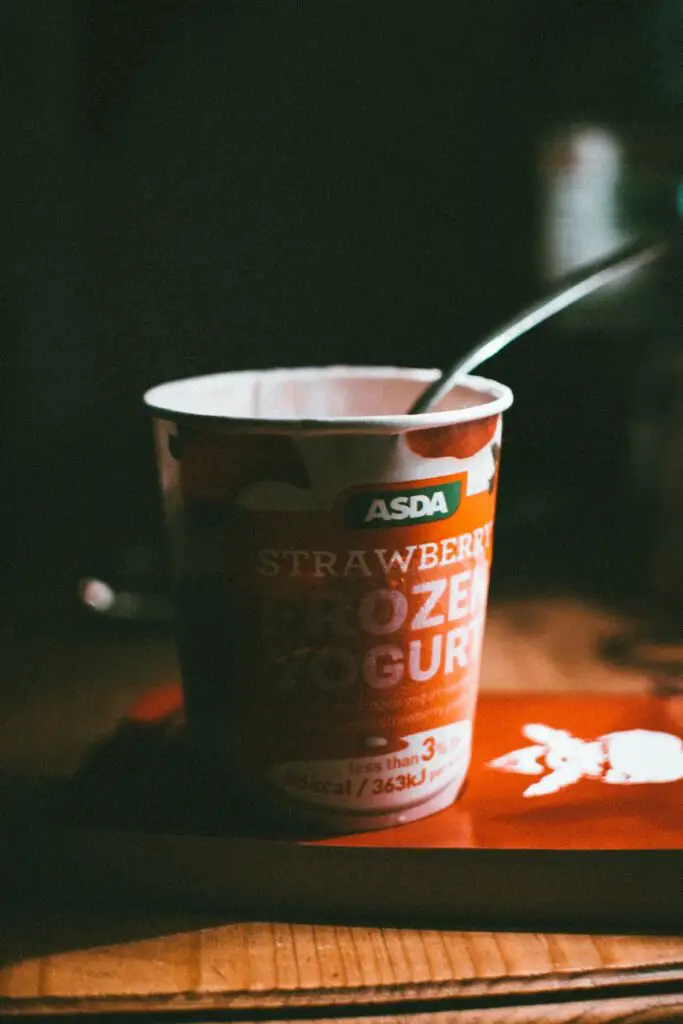We enjoy giving our pets a reward or snack. It makes them happy and it makes us happy, too.
But the food we enjoy eating can be harmful to them, and sometimes it’s hard to know which foods are safe and which aren’t. Yogurt is one example. We love it. It’s a real staple in our household and our dog always has his eye on the tub whenever we take it out of the refrigerator.
But can dogs eat strawberry yogurt? Or should we keep this delicious sweet treat to ourselves?
Is Yogurt Good for Dogs?
Yogurt can be a healthy treat for dogs. It’s high in calcium which builds strong teeth and bones. It’s also high in protein which helps build healthy cells in the body and maintains a healthy coat and digestion.
Choose plain Greek yogurt when shopping for your dog or regular plain yogurt. Some owners buy a plain probiotic for their dog to help support a healthy gut. Our dog enjoys plain Greek yogurt every few days because it’s thick.
Yogurt can be good for dogs but there are several caveats worth knowing.
You MUST NOT feed your dog anything with xylitol in it. Xylitol is a naturally occurring sugar used as a sweetener in some yogurts. It’s fine for humans but toxic to dogs. Dogs that have ingested xylitol should be taken to the veterinarian immediately. Always check the ingredients before letting your pet eat anything. Worryingly, the FDA has reported an increase in xylitol poisoning in dogs caused by sugar-free ice cream.
Some dogs are lactose intolerant. This means they can’t digest dairy products properly. You may not be aware that your dog has this until they get an upset stomach. We recommend only giving your dog a small amount of yogurt at first until you’re sure they can handle it.
Avoid yogurts containing artificial sweeteners. Xylitol is the major one to avoid but some of the others, whilst not toxic, can cause mild stomach upsets. Aspartame, sucralose, stevia, and saccharine should be avoided.
Avoid yogurts containing high levels of sugar. Sugar isn’t good for dogs and there’s no need for them to have it in their diet. Picking a plain regular or plain Greek yogurt is the balance between something that’s low in sugar and without sweeteners.
Can my dog eat yogurt every day?
One or two tablespoons of yogurt a day can be beneficial if you’re giving your dog plain yogurt. Fruit-flavored yogurts often contain higher sugar levels and so should be enjoyed less regularly.

Can dogs eat strawberry yoghurt?
Dogs can eat strawberry yogurt. Always check the ingredients first to ensure there are no dangerous or stomach-upsetting sweeteners or flavorings used. We’d recommend using plain yogurt over strawberry yogurt because there’s less sugar, but strawberries are fine for dogs to eat as a treat. Better than strawberry flavored yogurt, we’d suggest mixing real strawberries into plain yogurt. It’s healthier for the dog but it will still feel like a real treat to them.
Will Strawberry yoghurt hurt a dog?
Not unless there’s xylitol in it. If your dog is lactose intolerant or sensitive to sweeteners then it could cause an upset stomach.
And what about other yogurt flavors in your cupboard?
Can Dogs Eat Cherry Yogurt?
Cherry pits and stems can be toxic to dogs if swallowed as they contain cyanide. The fruit in a cherry yogurt should be made from the flesh which is non-toxic. Plain cherry yogurt without sweeteners or much sugar should be fine but we’d advise sticking to plain Greek yogurt which will contain far less sugar.
Can Dogs Eat Vanilla Yogurt?
Vanilla yogurt isn’t toxic (unless it contains xylitol) but vanilla extract and essence are, so don’t ever put that in front of your dog. Vanilla yogurt may also have sugar and sweeteners in it so we’d advise Greek yogurt.
Can Dogs Eat Frozen Yogurt?
Dogs can eat frozen yogurt so long as you apply the same rules as you do with regular yogurt by checking the ingredients.
Plain yogurt is best. But the occasional spoonful of strawberry yogurt will be fine so long as you’ve done due diligence on the ingredients. Dogs don’t need yogurt in their diet but it can be a useful additional supplement of calcium and protein when given in small doses.

